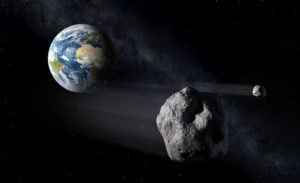"In space, no one can hear you scream" ,,, This was the motto from the first Alien movie and it has been used and abused in the decades since. I lost track of the number of times I have worked on ships and seen T-shirts or posters with "In the deep sea, no one can hear you scream ..." or similar. Although sound travels very well in water (and better than in air) ...
So how would it work in space? Sound does not travel in vacuum, despite what countless movies seem to imply (and yes, I love the sound effects of Star Wars or Farscape, even if I need to leave my scientific mind aside for a time). But space is made of much more than vacuum.
There are planets, first, and some of them are getting increasingly closer as plans for their exploration are firming up. Elon Musk gave a much talked about presentation at the International Astronautical Congress in Mexico last week. I was interviewed on Al Jazeera to talk about the actual feasibility of the scheme, and this still seems rather far off. The exploration of Mars, which needs to take place before any attempt at colonisation, will need to include assessing potential resources in the ground. We know there is water below the surface, from remote sensing by satellites in orbit around Mars. And there are very strong indications that some of this water is still freely flowing at the surface in specific areas. But what about other deposits, for example oxygen? How easy would it be to drill and get it? How stable would exploration platforms, or habitats, be as resources get extracted from below them? Like on Earth, these questions can be answered directly with acoustics. Sending sound waves of different frequencies through the surface, we can listen to their returns and find out how deep they are, and what they are made of. Just like seismics or non-destructive imaging (think about ultrasound scans of human bodies ...)
Planets are great (I love planets) but they are far away, expensive to get to, and with the current state of space exploration programmes, it will be a while before we can get more than passing glances at their marvels and really explore them. Closer to home, though, we have asteroids and comets. They are big pieces of rock or gravel (comets are often compared to "dirty snowballs"). They contain all sorts of minerals and oxygen or frozen water. And they often pass in the neighbourhood. So what about exploring asteroids?

This seems much more feasible, and there are actually several companies aiming to mine asteroids for their riches. These companies have been in existence for several years, so they are no "seven-day wonders" but real companies, with serious investors. The government of Luxembourg recently announced it had its own plans to support space exploration and space utilisation. And they organised a great workshop two weeks ago, inviting space industries to meet space scientists. It was a packed programme over two days, with world-famous scientists describing the main discoveries of recent missions to asteroids and comets, and their plans to learn more over the coming years. The ASIME-2016 workshop is now leading to a White Paper, which will lead to recommendations on space mining, the science behind it but also the implications for protection of any possible astro-biology (none found yet, but one can hope ...). I was there to present seismo-acoustics to a different audience, and it was very encouraging to see possible avenues for acoustic exploration of still mostly unknown planetary bodies ...
Once we get to them ... (but at least we have the tools ready ...)
Respond
